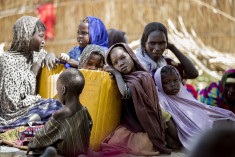-
Chitra Nagarajan on What’s Changed for Women in Lake Chad Region
March 27, 2020 By Wania Yad “Women and men face very different risks and challenges,” said Chitra Nagarajan, a writer and journalist who covers climate change, conflict, and gender. She spoke in this week’s podcast about what’s changed in the Lake Chad region. In the last few years the combination of profound climate change and high levels of insecurity have made life harder for the local population. To get a sense of how recent changes have affected Lake Chad’s residents, Nagarajan interviewed more than 250 people. These are some of her findings.
“Women and men face very different risks and challenges,” said Chitra Nagarajan, a writer and journalist who covers climate change, conflict, and gender. She spoke in this week’s podcast about what’s changed in the Lake Chad region. In the last few years the combination of profound climate change and high levels of insecurity have made life harder for the local population. To get a sense of how recent changes have affected Lake Chad’s residents, Nagarajan interviewed more than 250 people. These are some of her findings.“Women and men face very different risks and challenges,” said Chitra Nagarajan, a writer and journalist who covers climate change, conflict, and gender. She spoke in this week’s podcast about what’s changed in the Lake Chad region. In the last few years the combination of profound climate change and high levels of insecurity have made life harder for the local population. To get a sense of how recent changes have affected Lake Chad’s residents, Nagarajan interviewed more than 250 people. These are some of her findings.
“It’s very clear and we know this from other contexts as well,” she said, “that the people who face the most risk and who have been affected the most are those who were already vulnerable and marginalized beforehand or people who acquired vulnerabilities.” As a result, the conflict has impacted men and women differently. Men are much more likely to be viewed with suspicion by all parties to the conflict, more likely to be in detention, more likely to experience extrajudicial killing, and more likely to be recruited by force. Women, on the other hand, face high levels of gender-based violence like sexual abuse and exploitation, forced sex work, increased early marriage, and domestic violence.
Despite the harms that women have faced in this conflict, some are newly empowered, taking on roles previously off-limits. With men gone, women are heading households and finding ways to sustain families and communities. They wield the decision-making power in their households and communities. “And you really see how women have transformed their own understanding of what they are capable of and also their desires for what they want for their children,” said Nagarajan.
This desire to be self-sufficient has in turn increased girls’ education. I want my daughter to have education, to have access to opportunities, so that she will not suffer the way that I have or the way I am, Nagarajan recalled one woman told her.
But gender-based violence persists in the region. Due to an underfunded humanitarian response, many gaps exist. In addition, not enough services are provided to change attitudes about stigma and prevent violence. “It is good to provide services to survivors of gender-based violence, but even better than doing that is preventing the violence from taking place in the first place,” she said. “And we have seen very little truly preventative programming on the ground.”
Policymakers ignore the impacts of conflict on women’s reproductive health. Women and girls are not able to control their reproduction. And men do not want their wives to have access to contraceptives. “I do think that this is an issue of masculine ego and thinking I am a real man if I have lots of children,” said Nagarajan.
Because women and girls who are not married find it hard to access contraceptives, demand for highly unsafe methods to terminate pregnancies has increased. Women wish to end pregnancies for many reasons. They may not be able to take care of so many children. Other reasons include high levels of sexual violence, absence of men, and high levels of victim-blaming and stigmatization if the pregnancy is a result of sexual violence.
One young woman Nagarajan met was the sole survivor of her family. A soldier forced the woman to have sex in exchange for shelter, then left the area. The young woman relies on the goodwill of neighbors in an informal settlement in Nigeria. When I met her, said Nagarajan, her top priority was to end her pregnancy, because she feared neighbors would stop supporting her due to the extramarital nature of her pregnancy. But she had no access to help to end it.
Many people who live around Lake Chad get no support from governments or politicians. “Lack of governance and lack of effective services have been one of the biggest barriers both in terms of being a driver of violence but also in terms of providing services and support to the affected population,” said Nagarajan.
A more holistic approach needs to be taken into consideration to focus on civilian protection and reduce harm. “A lot more can be done,” she said, “to put these words into action.”
Photo Credit: Lake Chad Basin Crisis, January 2017. Photo by Espen Røst / Bistandsaktuelt, courtesy of Utenriksdepartementet UD.
Friday Podcasts are also available for download on iTunes and Google Podcasts.
 A Publication of the Stimson Center.
A Publication of the Stimson Center.

 “Women and men face very different risks and challenges,” said
“Women and men face very different risks and challenges,” said 

